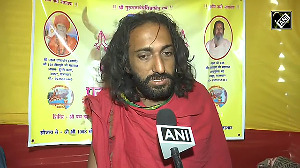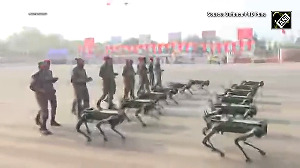Talks of a mid-term election early next year are in the air. Expectedly, opinion polls are being conducted to gauge the mood of the people. A few of them have already come out with their results.
In many of these surveys, the United Progressive Alliance has emerged in better shape than what its critics had feared. The National Democratic Alliance's prospects look worse.
Although the Congress as the main party in the UPA has failed to exploit the advantages that go with any ruling alliance, it has not done too badly in these surveys in terms of the number of seats that it would get if the elections were to be held now.
The Bharatiya Janata Party has fared poorly as it failed to regroup as an opposition party and identify issues that might strike a chord with people. The Left parties, one thought, would have gained as it was seen as a group that sustained the government at the Centre. But the opinion polls show that the Left also would do worse in a mid-term election than its performance in 2004.
These findings are not surprising. The BJP is caught in its own contradictions. Its leadership issues are yet to be resolved. Ever since it distanced itself from its Hindutva agenda and embraced economic reforms and the consequent "India Shining" campaign, the BJP seems to be going through an identity crisis.
Just as it had opposed the insurance reforms Bill during the United Front regime (mind you, reforms got the maximum boost during its rule at the Centre), it is now opposed to the Indo-US civilian nuclear deal even though its foundations were laid by none else than the NDA government. Thus, the BJP is looking like a party in search of election issues.
The Left's predicament is worse. The formation of the UPA government in 2004 was possible because the Left extended its support to the alliance. It emerged as a kingmaker party, wielding tremendous clout. At almost every stage of decision-making, the Left made it obvious that the UPA government could not do anything without first getting its concurrence.
Even threats of withdrawing support to the government were issued at regular intervals. Virtually every move, on which the Left did not see eye to eye with the government, had to be abandoned.
The current crisis surfaced only when an emboldened prime minister told everyone that the Indo-US nuclear deal, which was opposed by the Left, was non-negotiable. By its tough stance on this issue, which has driven the country to a mid-term election, the Left has endeared itself to none. Many of its leaders are acutely conscious of this. And this too may be one of the reasons why the Left has done poorly in the opinion polls. No electorate forgives a party that is seen as responsible for having pulled down a government that was doing a reasonably good job.
The Congress and its UPA partners may have gained from this. The Congress is now being seen as a victim of the Left's desire to influence government policies without being responsible for their consequences. Though such gains may be short-lived, it is reasonable to believe that this perception will help the Congress to garner more votes. The electorate does sympathise with political parties whose governments are pulled down by either their supporters or the opposition parties.
But the disconcerting message for the Congress is the survey result that inflation, rural employment and the condition of farmers are the three most critical issues bothering the electorate. The Congress party bosses cannot afford to ignore these warning signals.
While the wholesale price index-based inflation rate may have become benign, ruling at below 4 per cent, there is not much relief for the consumers. The consumer price indices, particularly for rural workers, are yet to show any deceleration, let alone a decline, in tune with the wholesale price-based inflation rate.
In spite of the launch of the rural employment guarantee programme with much fanfare, it seems jobs for the poor continue to be a big electoral issue. The Congress think tank, perhaps, got their priorities right by trying to create more jobs through the rural job guarantee scheme.
But perhaps no follow-up steps were taken to exploit the scheme for political gains. The obvious questions are: Did the scheme make a difference? And were the Congress leaders at the grassroots level adequately briefed about the flagship scheme and did they manage to take advantage of the scheme?
Finally, the survey finding on the condition of farmers is a warning to those Congress leaders who have allowed special economic zones to be seen as a scheme that forces farmers to lose land.
In a country, where precious little has been done to reform agriculture and reduce the people's dependence on it for livelihood, schemes that rob farmers of their fertile land can turn voters against the ruling party. If mid-term elections are indeed round the corner, it is time the Congress, as the ruling party, addressed these genuine, time-honoured concerns over prices, rural jobs and the condition of farmers.







 © 2025
© 2025